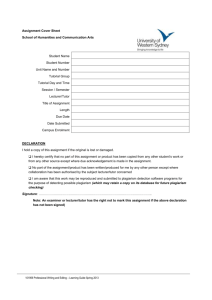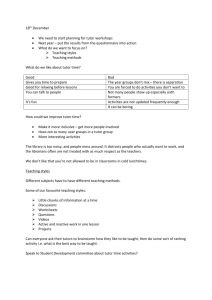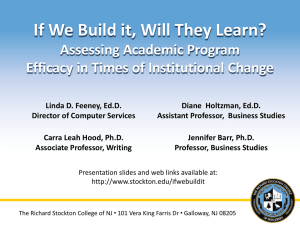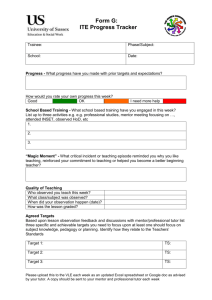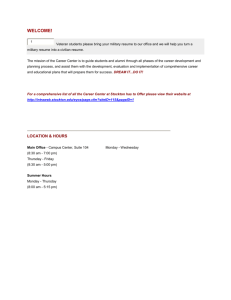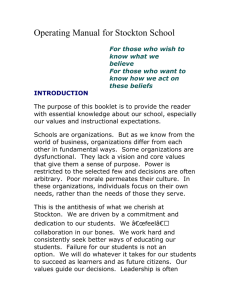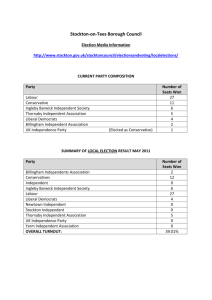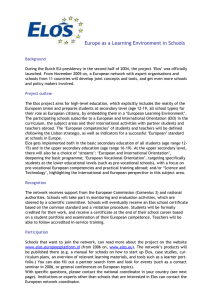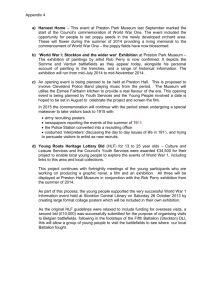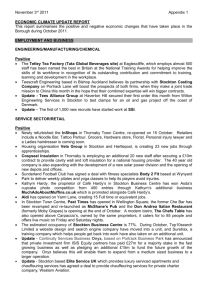Fall 1997 BASK 1102-003 Readings: Growing Up in the USA, a
advertisement
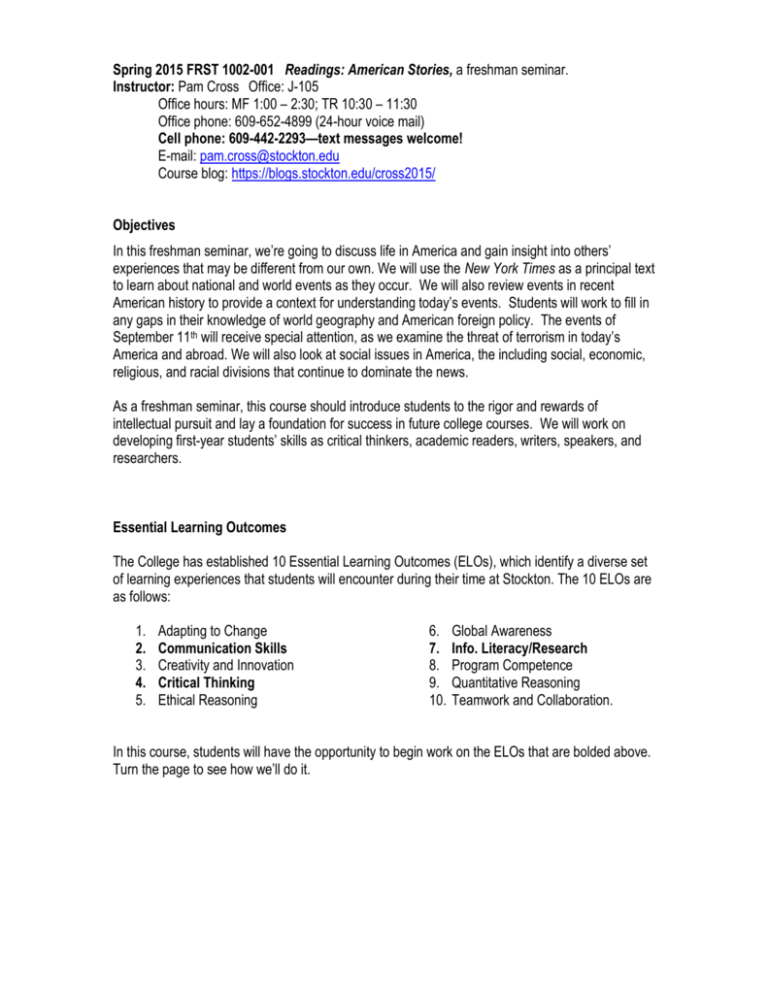
Spring 2015 FRST 1002-001 Readings: American Stories, a freshman seminar. Instructor: Pam Cross Office: J-105 Office hours: MF 1:00 – 2:30; TR 10:30 – 11:30 Office phone: 609-652-4899 (24-hour voice mail) Cell phone: 609-442-2293—text messages welcome! E-mail: pam.cross@stockton.edu Course blog: https://blogs.stockton.edu/cross2015/ Objectives In this freshman seminar, we’re going to discuss life in America and gain insight into others’ experiences that may be different from our own. We will use the New York Times as a principal text to learn about national and world events as they occur. We will also review events in recent American history to provide a context for understanding today’s events. Students will work to fill in any gaps in their knowledge of world geography and American foreign policy. The events of September 11th will receive special attention, as we examine the threat of terrorism in today’s America and abroad. We will also look at social issues in America, the including social, economic, religious, and racial divisions that continue to dominate the news. As a freshman seminar, this course should introduce students to the rigor and rewards of intellectual pursuit and lay a foundation for success in future college courses. We will work on developing first-year students’ skills as critical thinkers, academic readers, writers, speakers, and researchers. Essential Learning Outcomes The College has established 10 Essential Learning Outcomes (ELOs), which identify a diverse set of learning experiences that students will encounter during their time at Stockton. The 10 ELOs are as follows: 1. 2. 3. 4. 5. Adapting to Change Communication Skills Creativity and Innovation Critical Thinking Ethical Reasoning 6. 7. 8. 9. 10. Global Awareness Info. Literacy/Research Program Competence Quantitative Reasoning Teamwork and Collaboration. In this course, students will have the opportunity to begin work on the ELOs that are bolded above. Turn the page to see how we’ll do it. Essential Learning Outcome Description of Ability Assignment(s) Communication Skills The ability to create and share ideas effectively through speech or in writing with diverse audiences and in various formats. You will write in and for just about every class. You will communicate what you’ve learned through your writing. There will be formal writing assignments, informal writing, a research assignment, along with a discussion of professional or real-world discourse. Critical Thinking The ability to formulate ideas that are clear, rational, open-minded, and informed by evidence. All of our class discussions and written assignments will work on developing your critical thinking skills, as I will pester you to support your views with evidence and logical examples and to be conscious of your biases. The ability to conduct research and recognize important information, identify how to find and evaluate it, and demonstrate how to present the information in a legal and ethical manner (avoid plagiarism). One essay will require research, and we will work through the process from start to finish— asking good research questions, finding credible sources, arriving at a thesis, organizing information, integrating source material and quotations without plagiarizing, and documenting sources according to MLA or APA format. Information Literacy/Research Texts Required: Firehouse, by David Halberstam Whistling Vivaldi, by Claude Steele Newjack: Guarding Sing Sing, by Ted Conover New York Times, online articles Recommended: Diana Hackers’ Rules for Writers or A Writer’s Reference Attendance Policy In order to do well in this course, you should plan to attend every class session. We will have quizzes or ways to earn participation points every class. You may not make up in-class work, so missing even one class will affect your grade. While in class you should make an effort to stay engaged. I understand we may have shy people here, but please do your best to participate. At the end of every class session, I will announce the assignment for the next class. If you miss class, you need do any or all of the following to get the assignment and find out what you missed: Stop by my office in J-105 Check the course web site https://blogs.stockton.edu/cross2015/ Email me, call me, or text me anytime—24 hours a day. I’ll get back to you. As you can see, I leave you little excuse to come to class unprepared. Sneaky me. 3 Punctuality. We will usually start class with a quiz or an opportunity to earn participation points that you have 15 minutes to complete. If you come to class ten minutes late, I won't scold you, but you'll have only 5 minutes left to complete the quiz. And if you're 15 minutes late, sorry, but you get a zero on that quiz. No whining. And can you name one profession where it’s OK to be late? Does anyone like a whiner who’s always late? Evaluation I use a point system for grading, and you need a C average (or at least 72%) to pass the class: 3 short essays (worth 50, 100, and 100 points) 3 in-class tests with essay questions (150 each) One research essay Almost daily in-class points (@5 to 10 points) Total Here’s how I will assign your grade: 93 - 100% of all points = A 90 - 92 = A87 - 89% = B+ 83 - 86 = B 80 - 81 = B77 - 79 = C+ 250 450 150 150 1000 points 72 - 76 = C* 68 - 71 = C66 - 67 = D+ 63 - 65 = D 60 - 62 = DBelow 60 = F * A grade of C or better is required to fulfill the first-year studies competency requirement. If you earn a grade lower than a C for this course, you must enroll in FRST 1002 next term with a different instructor. If this is your second time taking FRST 1002, you need to pass this course with at least a C to avoid dismissal from the College. If you withdraw from this FRST course it counts as an official attempt at the course, except under documented medical circumstances. Extra credit opportunities through campus engagement. There are all kinds of great events happening on campus. Attend one of these events and earn 5 extra credit points, up to a max of 25 free points (5 points per event). I will announce what’s happening and post upcoming events on the blog. ULTRA credit (Undergraduate Learning, Training and Awareness) earned, too. How to work with tutors in the Writing Center As I am Coordinator of the Writing Center, you folks will be our VIP guests—always welcome and always noticed. Here’s how the Writing Center works: we are open in J-105 Monday – Thursday from 9:00 a.m. – 6:00 p.m. and on Fridays until 4:00 p.m. We also have evening hours Sundays through Thursdays, from 7:00 – 9:00 p.m. at the TRLC near the dorms. In addition, there will be a tutor in the Learning Commons area of the Library Monday through Thursday evenings from 6:00 – 9:00 p.m. I want you to work with a tutor in this class. If you are repeating the course, I’ll insist on it. I’ll help you find a tutor who suits you and whose schedule fits yours, so you can work as a team. Come early and often, and come ready to work. A tutor can help in all phases of the writing process, understanding the assignment, brainstorming and forming ideas, organizing, editing, and proofreading. The tutor will not edit for you. Our goal is to help you become more independent, not to foster a dependency. Talk to me about ways to earn extra credit if you commit to working closely with a tutor this term. 4 Note on accommodations for students with disabilities The Learning Access Program is available to assist Stockton students so that individuals with physical, psychological, or learning disabilities can achieve to their potential in all their college classes. If you have any kind of learning difference or disability and you wish to request special accommodations, you must register with the Learning Access Program at the beginning of the term and provide appropriate documentation to the program director. Please contact the Learning Access Program located in J-204 or by calling 652-4988. Additional information may be obtained from the Learning Access Program web site. Or you could see me privately to talk about your options. A word or two on plagiarism and cheating I, along with every faculty member at Stockton, take plagiarism and acts of academic dishonesty seriously. Since the beginning of organized education, students have been coming up with ingenious ways to cheat, and faculty members have been trying to catch them. Your generation has more ways to cheat than ever imagined, but alas, your teachers also have more ways to catch you. Here’s what will happen in my class if you cheat: If I catch you, you will get a zero for that assignment and you’ll get a charge of academic dishonesty lodged with the Provost’s Office. I am the nicest teacher you will ever have—until I catch you cheating. No whining; no excuses Some of you may be in the habit of whining. You know who you are. Stop it. It’s bad for you and everyone around you. I plan to nudge you all toward taking responsibility when you mess up. If you mess up (miss class, forget an assignment, turn in a weak effort), avoid externalizing the problem and man up (or Pam up, as I say). No blaming technology or tutors or alarm clocks or even flu symptoms. If I have one piece of advice for you young people, it’s this: Play the hand you’re dealt; and keep playing. Got that? On a positive note I think I have a reputation as a dedicated teacher and relentless nudge (some students have used other words). Please know that I will be rooting for each of you to succeed, and I will make it my job to provide you with the support you need to get where I want you to go. And, yes, I will fuss at you if you mess up. Please feel the love.

